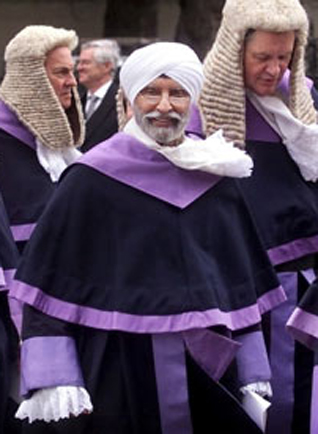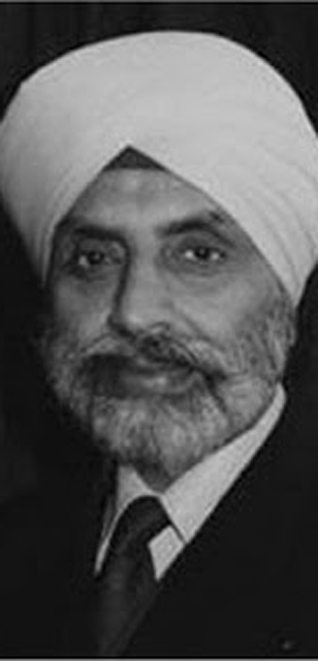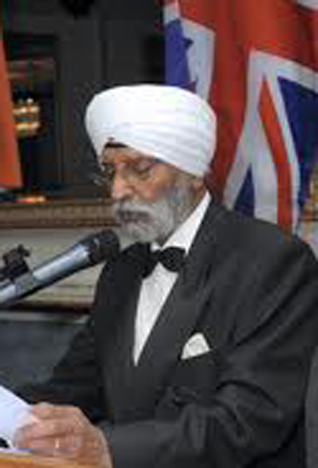Our Heroes
Sir Mota Singh
[1930 - November 11, 2016]
NEWS REPORT
SIR MOTA SINGH
[1930 - November 11, 2016]
Sardar Mota Singh passed away on November 11, 2016. Our deepest and sincerest condolences to his family. He was a giant in modern Sikhdom.
LIFE & TIMES
Varinder Singh
Born in 1930 in Nairobi, Kenya, Mota Singh was only sixteen years of age when he lost his father, Sardar Dalip Singh, on 30 December 1946.
It was a day of immense religious significance: it was the birth anniversary of their Tenth Master, Guru Gobind Singh.
On the morning of 30 December, Sardar Dalip Singh had visited the Singh Sabha Gurdwara in Nairobi in celebration of the gurpurab. By midday, he was back at home. Shortly thereafter, he rushed to the rescue of an Indian lady screaming for help for she had been attacked by an African. The latter, seeing Sardar Dalip Singh, took flight.
A long chase ensued. Sardar Dalip Singh eventually caught up with and apprehended the assailant but was fatally stabbed by him.
With five younger siblings - four brothers, the youngest one being only three months old, and a sister - Mota Singh became the head of the family. He had no option but to leave school prematurely to fend for the family, which also included his widowed mother, aged only thirty two, and his paternal grandfather aged sixty two, who had lost his only son.
Mota Singh's school teachers, knowing that he was gifted, convinced his family and relatives that he should resume studies and complete his matriculation.
They undertook to finance his school education. Mota Singh matriculated. After a short stint as a clerk at the East African Railways and Harbours, he secured a clerical position in a European firm of lawyers in Nairobi.
Sardar Dalip Singh had always had high ambitions for his academically gifted sons. He had planned to send Mota Singh first and, in the fullness of time, his other sons to England for further studies. Such plans were now laid bare.
However, at that time, the Inns of Courts in England, which are the training institutions for barristers, changed rules for overseas students, permitting them to complete the first part of the two-part Bar studies by a correspondence course in the country of their residence. For the second part, however, the students had to go to England.
To lift the gloom after the father's death, and bring about a modicum of happiness in the family, the family and relatives decided that Mota Singh should get married.
He was married to Swaran Kaur in 1950. A year later the family rejoiced in the birth of his daughter. Whilst fending for his whole family during day, Mota Singh pursued his Bar studies at night. In 1953, Mota Singh set sail for England, accompanied by his wife and daughter, to complete the second part of the Bar studies,
On arrival in England, Mota Singh took up employment at the Indian High Commission. Mrs Mota Singh, likewise, started working so that the family of three could become self-sufficient. In England too, Mota Singh would work during day and study at night.
Back in Kenya, the second brother, Manmohan Singh, had had to leave school before matriculation to provide for the family. A year later, the third brother, Surinder Singh matriculated and took up clerical employment, like Manmohan Singh, at the Kenya Police to supplement the family income.
Five years after Sardar Dalip Singh's death, the grandfather passed away. Mota Singh was in England at that time.
Mota Singh passed the Bar final examinations in 1955. After returning to Kenya in 1956, he started his own practice as a Barrister in Nairobi. The practice flourished.
In 1959, he was joined in his practice by another newly qualified barrister, Sushil Guram, who had studied at Oxford University. There was much in common between the two and they built up one of the most successful law practices in Kenya.
Meanwhile, the second brother, Manmohan Singh, had matriculated. Mota Singh sent him to England in 1959 to study for the Bar as a full time student. Mota Singh also fulfilled his duties as a father-figure to his other siblings in full measure. He raised the younger ones, educated and married them. In 1963 he sent his brother Varinder Singh to England to study Chartered Accountancy.
Mota Singh would not have been able to acquit himself of his responsibilities as a father figure towards his siblings with such generosity as he did, without the unqualified support of his wife.
For their part, Mota Singh's siblings, all retired now, have the utmost love, respect and affection for their eldest brother and, indeed, for their sister-in-law Swaran Kaur.
As a lawyer and as an accomplished public speaker, Mota Singh built up a reputation in Nairobi and he was urged to go into politics. He was elected, at first as a City Councillor and then elevated to the position of Alderman of the City of Nairobi.
He immediately made a mark in the well publicised Council debates.
In the colonial Kenya of 1960s, all the administrative and significant official posts were held exclusively by the English until the mould was broken by Mota Singh in 1961. In that year, he was appointed the first non-English man as the Secretary of the Law Society of Kenya. Subsequent to this, he was honoured with other appointments which included:
* Secretary of the Disciplinary Committee of the Law Society
* Secretary of the Council of Legal Education
* Vice President of Justice, a body affiliated to the International Commission of Jurists, Geneva
* Arbitrator involving Kenya Government, Local Government and Private Organisation disputes
* A panel member involved in drafting legislation to Kenya Parliamentary Elections on a Common Franchise following a Round Table Conference in London
* Chairman of School Governors
* Trustee of various sports and charitable organisation
With such a record, achieved in just six years since he had started his practice at the Bar in Nairobi, and with even brighter future prospects for him there, Mota Singh decided in 1965 to migrate to England.
The leading European and Asian lawyers in Nairobi were in no doubt that he was making a grave mistake; they were only too well aware of the difficulties, even for the English Barristers, of practising at the English Bar, which was, and still is, regarded as a "closed shop".
Such difficulties were brought into focus in the 1950s when a couple of hugely successful senior English Barristers (QCs) in Nairobi had migrated to England to practice there. They failed miserably to get off the ground and were obliged to return to Kenya to carry on their lucrative practices there. What hope was there for Mota Singh, they thought, when he had to contend with two additional and highly significant disadvantages. First, he was non-white and, second, he donned a turban.
Barristers in England were not allowed to appear in a court without a wig.
The English Bar operates in a unique and highly restrictive way. Barristers in England are exclusively dependent upon Solicitors, who have the sole right to instruct them ( "brief" them, in legal jargon). Direct contact between a Barrister and his client is not permitted. In the interests of their clients, Solicitors, for their part, are highly selective when choosing which Barrister they consider worthy of being briefed by them. Unless, therefore, a Barrister has excelled himself at the Bar, built up a reputation, and is of the right pedigree, he has no hope of being briefed by Solicitors, who were all English in those days.
Until the mid 1990s, there were only one or two Asian Solicitors in England, with modest, run-of-the-mill practices. The expectation of an English Solicitor instructing an Asian or any non-white Barrister, however good, in those days was so far fetched as to be non-existent.
It was also impossible for non-white Barristers, if any, hoping to practice at the English Bar, to have any prospect of being admitted as tenants in a Barristers' "Chambers" - a pre-requisite for a Barrister wishing to practice at the English Bar.
It was against this background and against the heavily stacked odds that Mota Singh came to England with the intention of practising at the English Bar.
[This bio was first published in May 2014.]
Continued tomorrow ...
November 13, 2016
Conversation about this article
1: Dr Visho Sharma (Kalamazoo, Michigan, USA), November 12, 2016, 9:40 AM.
S. Mota Singh, a friend from high school days, was a truly noble person. A sideline: he was a fearless opening batsman. His smile was frequent, and a mile wide. He was an exemplar of an elder brother. We'll always remember him with great pride.
2: Bhupinder Singh Mahal (Dundas, Ontario, Canada), November 15, 2016, 12:43 PM.
I was acquainted with Mota Singh during my time in Nairobi. We became friendly when he came to London in the mid-fifties to complete part ll of his Barrister-at-law examinations. We stayed in touch intermittently. He made a point to flatter me on reading my articles in 'The Sikh Review', 'Abstracts of Sikh Studies', and 'Sikh Messenger'. I was in high school in the late 1940’s when Mota Singh’s father was stabbed to death by an African who he was thwarting from snatching a gold chain from the neck of a Gujarati lady. The family was left in distressed circumstances. The Sikh community then rallied around the family. Mota Singh was urbane, worldly and refined in manner. Sikhs are indebted to him for, inter alia, his unwavering stand on wearing his turban instead of a judge’s wig. His loss will be felt by us all.





